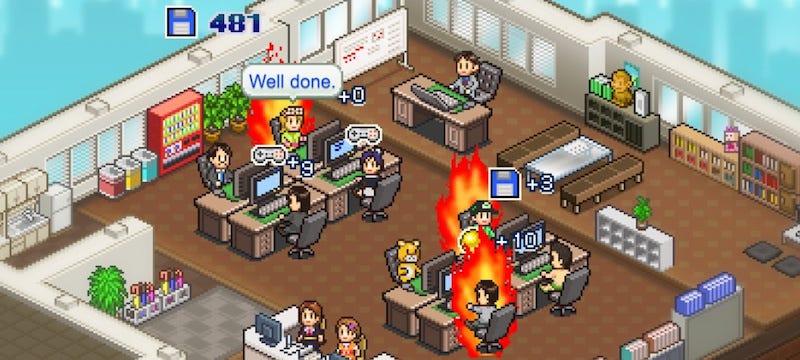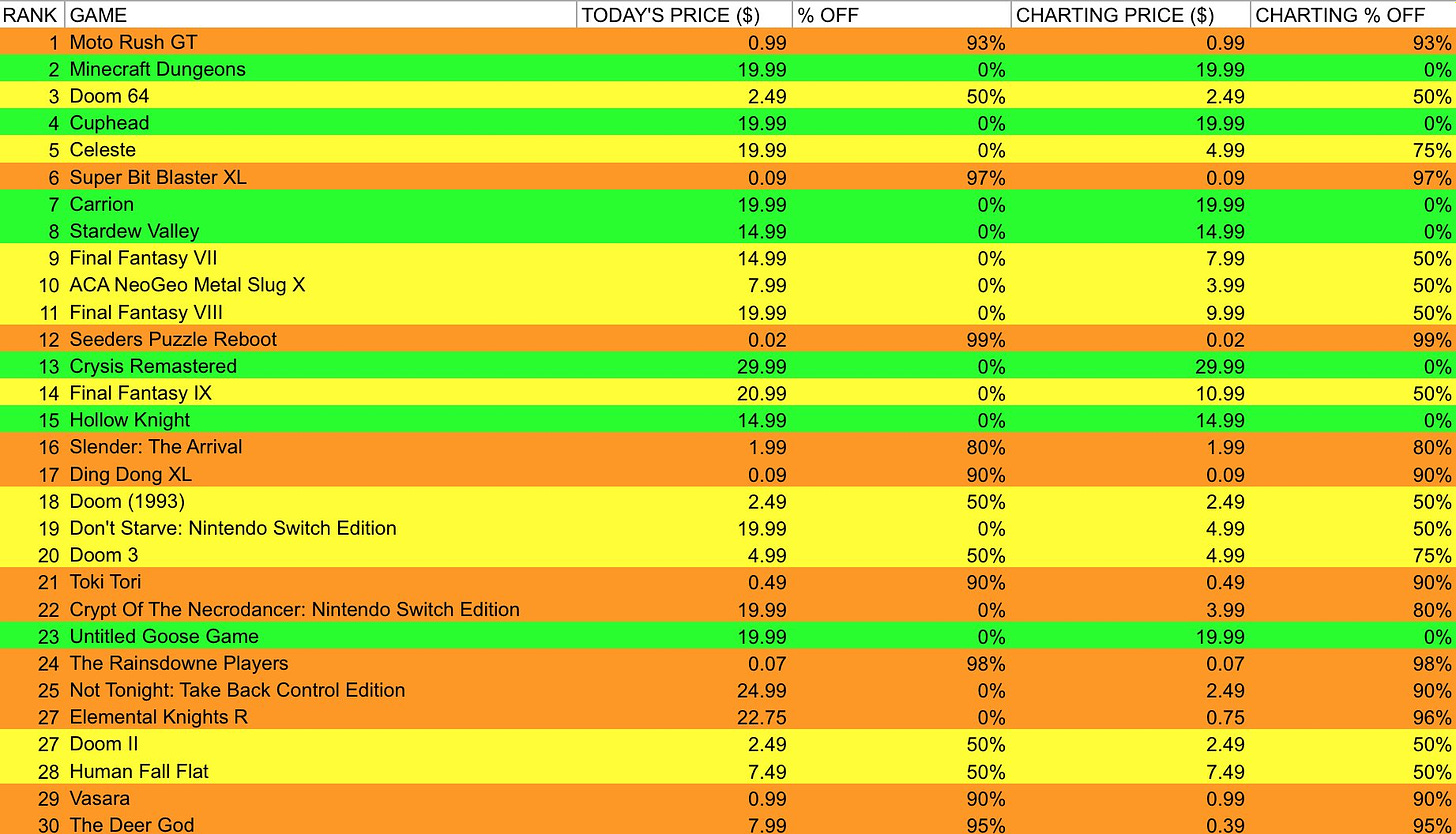Trending
Opinion: How will Project 2025 impact game developers?
The Heritage Foundation's manifesto for the possible next administration could do great harm to many, including large portions of the game development community.

Featured Blog | This community-written post highlights the best of what the game industry has to offer. Read more like it on the Game Developer Blogs or learn how to Submit Your Own Blog Post
A key part of discoverability is making sure you’re getting the right buzz. And the right publishers can really help with that. Lots of info on this - and more - within!

[Hi, I’m ‘how people find your game’ expert Simon Carless, and you’re reading the Game Discoverability Now! newsletter, which you can subscribe to now, a regular look at how people discover and buy video games in the 2020s.]
Welcome to the latest GameDiscoverabilityland round-up, in which I flit around a whole bunch of subjects in the ‘game discoverability & game platform business’ lexicon - and try to keep it under a few thousand words in length.
Lots happening again this time out. So let’s get it going with an excellent data set from the rather good (but I’m biased) GDC Summer virtual event that took place last week.

A key part of discoverability is making sure you’re getting the right buzz. And the right publishers can really help with that. (As does having enough money to actually complete your game, I guess?) But there are a multitude of things to think about when signing a deal.
So, it’s great that Kellen Voyer of Voyer Law did a virtual talk at GDC Summer which “collected data from 30 publishing agreements for a variety of non-mobile indie games to give developers an idea of what other teams are agreeing to in terms of advances, revenue share, IP ownership, and more.” (I’m using the Gamasutra write-up here, but PC Gamer and GamesIndustry also did articles based on the data that are worth looking at.)
On upfront payments: “The average advance to fund a game is $318,000, including both advance and no advance deals.. counting only deals with an advance, the average amount is $460,000. The lowest advance was $100,000 and the highest $2 million. 18 percent of the agreements had no advance, likely due to higher revenue share.”
One notable point: “42 percent of deals require advances to be recouped before developers see a single dollar. 58 percent see the advance recouped while both the developer and publisher receive revenue share.” Voyer notes, and I agree, that you should get a split recoup on revenue share - unless you think your game will recoup in the first month or two.
And on rev split: "The average revenue split sees developers taking 60 percent, publishers taking 40. That jumps up to 71 percent to devs in the case of no-advance deals, often seen in deals with nearly-finished games that only need marketing support and the like. That drops to 55 percent to devs when only averaging deals that include an advance." Again, not surprised, but great to have real data on it.
Concluding, there’s always outliers - more generous publishers %-wise, smaller ones who give tinier advances than this. But, this is a benchmark - and I love benchmarks! (Kellen told me they plan to open up the data and crowdsource more in the future! I’ll post here when that happens.)
Perhaps I’ve been discussing this a little bit too much in recent weeks. But re: how discounting is affecting the Nintendo Switch eShop game charts, I made a color-coded diagram explaining the state of play.
Here my analysis, for August 9th 2020's U.S. eShop digital chart (ranked by 14-day unit sales):

The eShop charts are complex. Games zoom up them if they’re X% off, but often stay there after the discount's done. I listed the current price, but also the ‘charting price’, which was the discounted price that got the game in the charts in the first place. Green = full-price, yellow = 50-79% off, red = 80-99% off.
As I noted on Twitter: “Yes, this means that only 7 games in the eShop digital top 30 are actually selling at full price. So 23 made it into the charts by selling at 50% off or more, & 12 made it in by selling at 80% off or more.”
We’ve heard that your sales go up with a 40-50% discount, thanks to popular subReddits like Nintendo Switch Deals & various Nintendo fan blogs/social media. But they go down again, unless you start charting on the ‘deal’ or overall eShop charts in a particular country.
And you need to be a fairly well-known game (Final Fantasy, Doom, etc!) to chart at 40-50% off - which is why a lot of people are getting ‘extreme’ with discounting. Some of them don’t care about the money, and just want lots more people to play their game.
(Final weirdness: you really don’t sell many copies after the discount is done. So this leads to the super weird phenomenon of 30% of the eShop charts or more not selling copies while… actually in the charts. The mind boggles.)
There’s still plenty of other fish in the sea, velociraptors in the pen, baboons in the enclosure, and so on. So let’s get to the rest of the game discoverability news for this week:
I’m sure you all got the email already, but the Steam Game Festival (demos! of unreleased games!) is returning in October. Same general idea as last time, though submitted games “must launch between October 13, 2020, and May 1, 2021”, which is a similar time frame to the last demo showcase.
We just had a good ‘how we pitched our game to publishers’ Twitter thread, but here’s another great one, from the developers of Backbone. Once again - have a playable prototype, be direct, pointed, and specific about your asks, and reach out to as many relevant publishers as possible.
Following my updated sales/reviews stats, Richie at Dutch Game Garden has updated his Steam Guesstimator to include sales stats using the new ratios. Some of the estimating is a little granular on the Guesstimator, but this type of tool is super useful for thinking about real budgets & sales possibilities.
A couple of other GDC Summer things: Chris Zukowski summarized three of the most actionable talks, including Victoria Tran and Dana Trebella’s on game market & competitor research, which I really dug - they also have their slides online. More SWOT analysis for games, plz!
No More Robots head honcho Mike Rose (also featured in the GDC Summer piece) had a fairly viral Twitter thread this week about ‘Brutal Reasons Why Your Game Isn't Going to Sell, and What You Can Potentially Do To Turn It Around’. Basically: make games swiftly, don’t presume you’ll hit big with your first one, look for uniqueness and beware crowded genres, & is your game genuinely visually attractive? (Read the whole thread for extra points and context!)
Just spotted that Apple Arcade’s upcoming games are getting a bit stronger, in my view - or at least, a bit less boutique indie. (It includes the new Samurai Jack game and Hello Games’ intriguing side project The Last Campfire, plus the next title from Oxenfree creator Night School.) So we’ll see where this goes longterm, right?
Platform rebranding thing! The free indie games/perks/Twitch subs formerly known as Twitch Prime is now being labeled as Prime Gaming, which makes sense if you know what their other offerings (Prime Video, etc) are called. I wonder what percentage of Twitch viewers with Prime use their free sub? And how the bundled goodies may evolve?
Micro-links: Apple got more specific about why Xbox Game Pass & other streaming game services aren’t on iOS, a fun piece on how Fall Guys’ key giveaways to streamers really helped it be a smash hit, here’s a good guide on how to go viral on Imgur.
To end things out, here’s something I spotted this week:
Standalone 'prologue' demos as separate Steam items are still a thing, at least visibility-hacking wise - 3/10 'New & Trending' spots in the U.S. are Prologues right now. pic.twitter.com/31JR5ymGOY
— Simon Carless (@simoncarless) August 12, 2020
Notably, Daniel Gubala pointed out in reply: “EXOR Studios and Ultimate Games have both tied their prologues to a publisher sale - using the daily deal visibility was a great kick-start for the releases.” So that’s clever cross-promotion in action!
Read more about:
Featured BlogsYou May Also Like